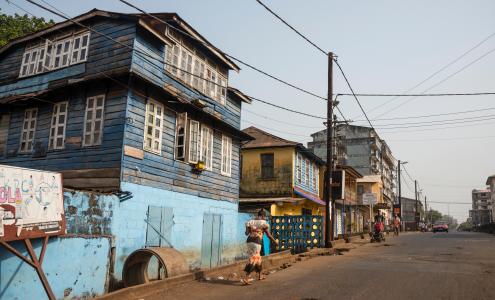
Project Details
Improving Sierra Leone’s power system
Evaluating infrastructure and identifying opportunities to improve the power system
Background, challenges and context
Power systems are notoriously difficult to research and adapt. They bring together technical, economic, social, and institutional challenges, while selling a product that is politically sensitive (requiring low tariffs) but needing substantial investment (requiring high tariffs) to expand. Furthermore, new renewable energy technology, such as solar PV, is rapidly declining in cost, but is usually not dispatchable and requires new balancing mechanisms.
Understanding and addressing energy system issues requires a whole systems approach, reflecting the dependencies and co-evolution of energy infrastructure and institutions, economic activity, technology, and society.
Research overview and objectives
This research project will incorporate insights from the social sciences, engineering, and economics. This multidisciplinary approach includes three core work streams, which will generate insights to support the development of decision support tools and complementary policies, enabling a path to the rehabilitation of a severely challenged power system.
The individual workstreams will address specific research topics:
-
Evaluating existing infrastructure and identifying opportunities and approaches for increasing efficiency and reliability
-
Exploring options and delivery pathways (both tariffs and infrastructure) for increasing access to electricity
-
Identifying how improved electricity access and reliability can support economic growth opportunities
The workstream insights are interdependent, and will be brought together through whole systems approaches implemented by the project researchers and their colleagues as part of the Oxford Martin Programme on Integrating Renewable Energy. These integrated findings will then be used to support research uptake activities.
The first workstream will explore opportunities for increasing efficiency and reliability in relation to existing infrastructure, focusing mainly on Freetown. Working with local researchers, the team will undertake a series of energy audits and surveys to identify how energy is currently being used in residential and commercial settings to meet a variety of services (e.g. food preparation, refrigeration, and lighting). The team will identify opportunities for technology, management, and behavioural shifts to improve efficiency and cost-effectiveness, and model the impact this could have on future load profiles and existing electricity infrastructure.
A cost benefit analysis will compare different mechanisms for delivering the potential efficiency improvements identified, in terms of their expected impact and costs. This, together with a comparative analysis of similar efforts in other markets, will help to identify the financial incentives and instruments most likely to lead to the adoption of more energy efficient appliances and measures by consumers and industry, as well as identifying which are the most cost-effective, and which will deliver the best return on investment.
The second part of the project will evaluate mechanisms to increase access to electricity in rural settings. Research will be carried out among end users across a range of socioeconomic groups and will explore current energy technologies and practices, as well as future aspirations for electrification and willingness to pay for energy services. It will deliver insights into appropriate tariff structures to support optimal investment and operation of an evolving rural electricity sector. This part of the project will also examine cost structures associated with generation, transmission, distribution, and system balancing (historically and future-facing) in on-grid and off-grid/mini-grid contexts, as well as the political economy surrounding the sector.
The third part of the project aims to understand how increased access to electricity can deliver business growth or new business opportunities both nationally and within rural settings. It will examine existing and potential future contributions to GDP from key sectors and limitations on revenue, in both grid-constrained and unconstrained settings. It will also identify aspirations for new business opportunities in rural settings, and explore how improved access to electricity might deliver new income streams within communities.
A further workstream on research uptake will ensure close interaction between the University of Oxford team and key stakeholders to ensure the research remains relevant and implementable. A strategic advisory board, comprising people working in the power sector in Sierra Leone and chaired by Phil Mann, will help to facilitate this.
The primary output of this research project is to develop a co-created pathway, with associated decision tools, to enable an investable power sector that delivers energy to end users that is affordable, clean, and that has defined availability.
Local partners
Strategic Advisory Board with ECREEE (ECOWAS Centre for Renewable Energy and Energy Efficiency)
Renewable Energy Association
Power for All
Ministry of Energy
Phil Mann, Senior Energy Advisor at DFID, who has lived in Sierra Leone for several years
